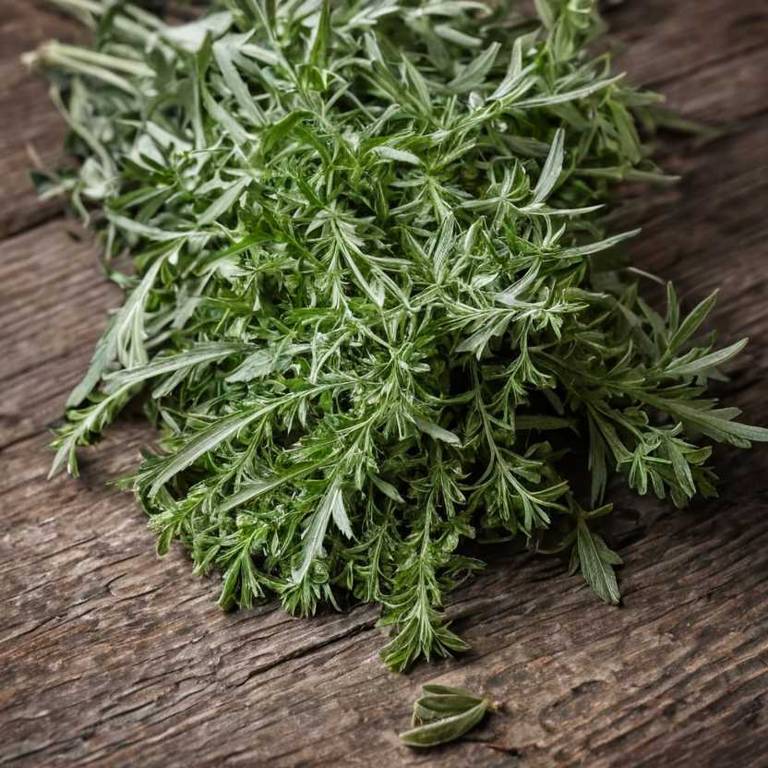By Leen Randell
Updated: Jul 06, 2024
10 Health Benefits Of Artemisia Vulgaris (Mugwort)

Artemisia vulgaris, also known as mugwort, has health benefits such as reducing inflammation, improving digestion, and relieving menstrual cramps.
Its medicinal properties, including sesquiterpenes, flavonoids, and essential oils, contribute to these benefits.
For instance, the anti-inflammatory compounds in mugwort can alleviate symptoms of conditions like arthritis, while its digestive enzymes help alleviate symptoms of irritable bowel syndrome, improving the quality of life for individuals suffering from these conditions.
This article explains in details the 10 best health benefits of Artemisia vulgaris.
1. Improves digestion
Artemisia vulgaris improves digestion because of its unique blend of bioactive compounds.
Its essential oils, flavonoids, and terpenes have been shown to enhance gut motility, reducing the risk of constipation and improving bowel regularity.
Additionally, mugwort's anti-inflammatory properties help soothe digestive issues such as irritable bowel syndrome (IBS) and gastritis, promoting a healthy balance of gut bacteria and alleviating symptoms of bloating and discomfort.
2. Reduces menstrual pain
Artemisia vulgaris reduces menstrual pain because it contains a unique combination of bioactive compounds that have anti-inflammatory and analgesic properties.
The plant's flavonoids and terpenes work together to inhibit the production of prostaglandins, which are hormone-like substances responsible for causing uterine contractions and cramping during menstruation.
By reducing prostaglandin production, mugwort helps to alleviate menstrual cramps, making it a popular natural remedy for women's reproductive health.
3. Alleviates symptoms of menopause
Artemisia vulgaris alleviates symptoms of menopause because it contains bioactive compounds that help regulate hormone balance.
The plant's estrogenic properties can reduce hot flashes and night sweats by mimicking the effects of estrogen in the body. Additionally, its antioxidant and anti-inflammatory properties may help alleviate other common menopausal symptoms such as mood swings, anxiety, and vaginal dryness.
This natural remedy has been used for centuries in traditional medicine to support women's health during this transition phase.
4. Possesses anti-inflammatory properties
Artemisia vulgaris possesses anti-inflammatory properties because of its rich composition of bioactive compounds, particularly flavonoids and sesquiterpenes.
These phytochemicals have been shown to inhibit the production of pro-inflammatory cytokines and enzymes, thereby reducing inflammation in the body.
Additionally, mugwort's antioxidant activity helps to neutralize free radicals, further contributing to its anti-inflammatory effects, making it a promising natural remedy for alleviating conditions such as arthritis, asthma, and skin irritations.
5. Acts as a sedative
Artemisia vulgaris acts as a sedative because it contains a unique combination of bioactive compounds, including sesquiterpenes and flavonoids.
These compounds have been shown to interact with the body's GABA receptors, which are responsible for regulating sleep and relaxation.
By stimulating these receptors, mugwort helps to calm the nervous system, reducing anxiety and promoting a sense of tranquility, ultimately leading to a deeper and more restful sleep.
6. Exhibits antibacterial effects
Artemisia vulgaris exhibits antibacterial effects because of its rich composition of bioactive compounds, particularly sesquiterpenes and flavonoids.
These compounds have been shown to inhibit the growth of a wide range of bacteria, including Staphylococcus aureus and Escherichia coli, by disrupting their cell membranes and interfering with protein synthesis. Additionally, mugwort's antioxidant properties help to scavenge free radicals, further enhancing its antibacterial activity.
This makes Artemisia vulgaris a promising natural remedy for wound infections and other bacterial-related diseases.
7. Supports liver function
Artemisia vulgaris supports liver function because of its ability to stimulate digestion and alleviate digestive issues that can put a strain on the liver.
Its antioxidant properties help protect the liver from damage caused by free radicals, while its bitter compounds stimulate the release of bile, which aids in detoxification and waste removal.
Additionally, mugwort has been shown to inhibit the production of pro-inflammatory cytokines, reducing inflammation and promoting overall liver health.
8. Enhances circulation
Artemisia vulgaris enhances circulation because of its rich composition of bioactive compounds.
The herb contains flavonoids, phenolic acids, and volatile oils that help to relax blood vessels, improving blood flow and reducing blood pressure.
Additionally, mugwort's stimulating properties can increase peripheral circulation, which helps to warm the extremities and relieve conditions such as Raynaud's disease and poor circulation in the legs.
9. Relieves skin irritations
Artemisia vulgaris relieves skin irritations because of its anti-inflammatory and antioxidant properties.
The herb contains flavonoids, saponins, and volatile oils that work together to reduce redness and swelling caused by skin conditions such as eczema, acne, and rosacea.
Mugwort's soothing effects can also calm irritated skin, promoting a healthy and balanced complexion while reducing the appearance of fine lines and wrinkles.
10. Repels insects
Artemisia vulgaris repels insects because of its unique chemical composition.
The plant contains a range of terpenoids and sesquiterpenes, which are natural insect repellents that can effectively deter pests from approaching the plant.
Specifically, the compound Artemisol has been shown to have strong insecticidal properties, causing irritation and discomfort to insects when they come into contact with it, making it an effective natural defense mechanism for mugwort against unwanted visitors.